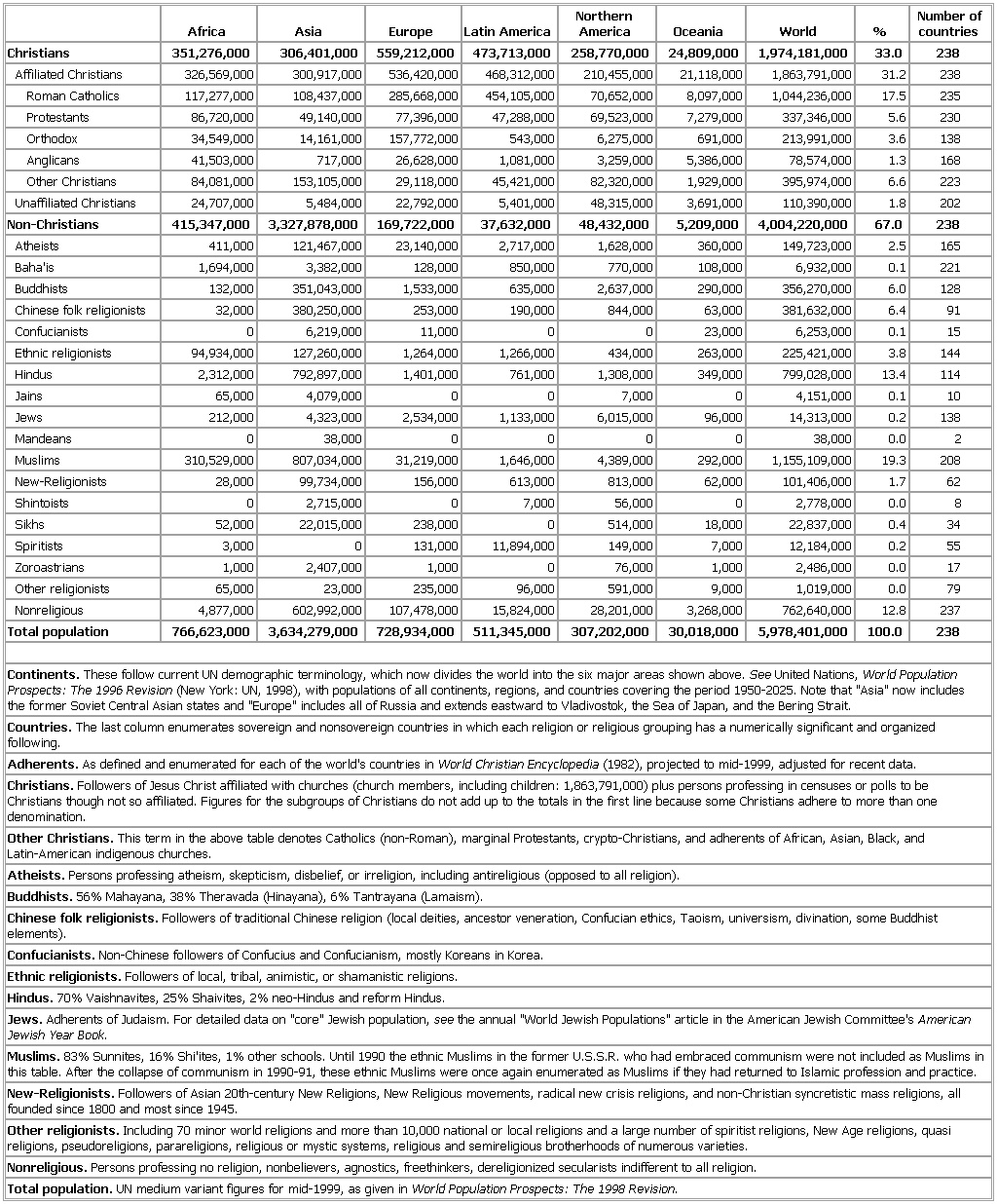- Worldwide Adherents of All Religions by Six Continental Areas, Mid-1999
-
▪ 2000countriesChristians 351,276,000 306,401,000 559,212,000 473,713,000 258,770,000 24,809,000 1,974,181,000 33.0 238Affiliated Christians 326,569,000 300,917,000 536,420,000 468,312,000 210,455,000 21,118,000 1,863,791,000 31.2 238Roman Catholics 117,277,000 108,437,000 285,668,000 454,105,000 70,652,000 8,097,000 1,044,236,000 17.5 235Protestants 86,720,000 49,140,000 77,396,000 47,288,000 69,523,000 7,279,000 337,346,000 5.6 230Orthodox 34,549,000 14,161,000 157,772,000 543,000 6,275,000 691,000 213,991,000 3.6 138Anglicans 41,503,000 717,000 26,628,000 1,081,000 3,259,000 5,386,000 78,574,000 1.3 168Other Christians 84,081,000 153,105,000 29,118,000 45,421,000 82,320,000 1,929,000 395,974,000 6.6 223Unaffiliated Christians 24,707,000 5,484,000 22,792,000 5,401,000 48,315,000 3,691,000 110,390,000 1.8 202Non-Christians 415,347,000 3,327,878,000 169,722,000 37,632,000 48,432,000 5,209,000 4,004,220,000 67.0 238Atheists 411,000 121,467,000 23,140,000 2,717,000 1,628,000 360,000 149,723,000 2.5 165Baha'is 1,694,000 3,382,000 128,000 850,000 770,000 108,000 6,932,000 0.1 221Buddhists 132,000 351,043,000 1,533,000 635,000 2,637,000 290,000 356,270,000 6.0 128Chinese folk religionists 32,000 380,250,000 253,000 190,000 844,000 63,000 381,632,000 6.4 91Confucianists 0 6,219,000 11,000 0 0 23,000 6,253,000 0.1 15Ethnic religionists 94,934,000 127,260,000 1,264,000 1,266,000 434,000 263,000 225,421,000 3.8 144Hindus 2,312,000 792,897,000 1,401,000 761,000 1,308,000 349,000 799,028,000 13.4 114Jains 65,000 4,079,000 0 0 7,000 0 4,151,000 0.1 10Jews 212,000 4,323,000 2,534,000 1,133,000 6,015,000 96,000 14,313,000 0.2 138Mandeans 0 38,000 0 0 0 0 38,000 0.0 2Muslims 310,529,000 807,034,000 31,219,000 1,646,000 4,389,000 292,000 1,155,109,000 19.3 208New-Religionists 28,000 99,734,000 156,000 613,000 813,000 62,000 101,406,000 1.7 62Shintoists 0 2,715,000 0 7,000 56,000 0 2,778,000 0.0 8Sikhs 52,000 22,015,000 238,000 0 514,000 18,000 22,837,000 0.4 34Spiritists 3,000 0 131,000 11,894,000 149,000 7,000 12,184,000 0.2 55Zoroastrians 1,000 2,407,000 1,000 0 76,000 1,000 2,486,000 0.0 17Other religionists 65,000 23,000 235,000 96,000 591,000 9,000 1,019,000 0.0 79Nonreligious 4,877,000 602,992,000 107,478,000 15,824,000 28,201,000 3,268,000 762,640,000 12.8 237Total population 766,623,000 3,634,279,000 728,934,000 511,345,000 307,202,000 30,018,000 5,978,401,000 100.0 238Continents. These follow current UN demographic terminology, which now divides the world into the six major areas shown above. See United Nations, World Population Prospects: The 1996 Revision (New York: UN, 1998), with populations of all continents, regions, and countries covering the period 1950-2025. Note that "Asia" now includes the former Soviet Central Asian states and "Europe" includes all of Russia and extends eastward to Vladivostok, the Sea of Japan, and the Bering Strait.Countries. The last column enumerates sovereign and nonsovereign countries in which each religion or religious grouping has a numerically significant and organized following.Adherents. As defined and enumerated for each of the world's countries in World Christian Encyclopedia (1982), projected to mid-1999, adjusted for recent data.Christians. Followers of Jesus Christ affiliated with churches (church members, including children: 1,863,791,000) plus persons professing in censuses or polls to be Christians though not so affiliated. Figures for the subgroups of Christians do not add up to the totals in the first line because some Christians adhere to more than one denomination.Other Christians. This term in the above table denotes Catholics (non-Roman), marginal Protestants, crypto-Christians, and adherents of African, Asian, Black, and Latin-American indigenous churches.Atheists. Persons professing atheism, skepticism, disbelief, or irreligion, including antireligious (opposed to all religion).Chinese folk religionists. Followers of traditional Chinese religion (local deities, ancestor veneration, Confucian ethics, Taoism, universism, divination, some Buddhist elements).Confucianists. Non-Chinese followers of Confucius and Confucianism, mostly Koreans in Korea.Ethnic religionists. Followers of local, tribal, animistic, or shamanistic religions.Jews. Adherents of Judaism. For detailed data on "core" Jewish population, see the annual "World Jewish Populations" article in the American Jewish Committee's American Jewish Year Book.Muslims. 83% Sunnites, 16% Shi'ites, 1% other schools. Until 1990 the ethnic Muslims in the former U.S.S.R. who had embraced communism were not included as Muslims in this table. After the collapse of communism in 1990-91, these ethnic Muslims were once again enumerated as Muslims if they had returned to Islamic profession and practice.New-Religionists. Followers of Asian 20th-century New Religions, New Religious movements, radical new crisis religions, and non-Christian syncretistic mass religions, all founded since 1800 and most since 1945.Other religionists. Including 70 minor world religions and more than 10,000 national or local religions and a large number of spiritist religions, New Age religions, quasi religions, pseudoreligions, parareligions, religious or mystic systems, religious and semireligious brotherhoods of numerous varieties.Nonreligious. Persons professing no religion, nonbelievers, agnostics, freethinkers, dereligionized secularists indifferent to all religion.Total population. UN medium variant figures for mid-1999, as given in World Population Prospects: The 1998 Revision.See as table:

* * *
Universalium. 2010.
